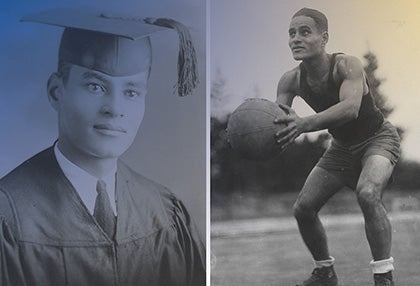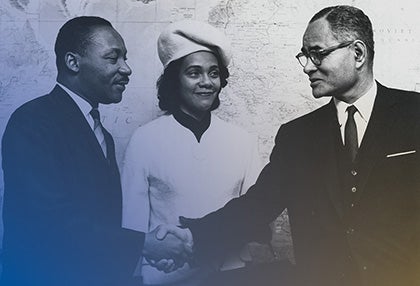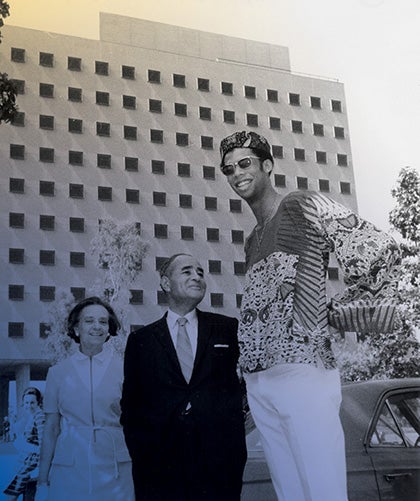The Meaning of Ralph Bunche
He is one of UCLA’s most storied graduates. His legacy shows why
This article was originally published on the UCLA Newsroom website on November 7, 2023. We share it here with UCLA Newsroom's permission.
The Meaning of Ralph Bunche
by Kal Raustiala, Promise Institute Distinguished Professor of Comparative and International Law; Director, UCLA Ronald W. Burkle Center for International Relations

Across the street from the United Nations headquarters in Manhattan sits a small plaza labeled Ralph Bunche Park. There is a large steel obelisk near a wall on which a passage from the Book of Isaiah is carved. It reads: “They shall beat their swords into plowshares.” New York City’s official parks guide calls it the city’s first “peace park.”
Stumbling upon the plaza one day a decade ago, I paused to consider the park and its namesake. I was in New York teaching a UCLA Travel Study program. Each summer, for many years, I would bring 25 Bruins for a deep, monthlong dive into global diplomacy. Occasionally, Ralph Bunche’s name would arise in class. Rarely did my students know much about him.
In fact, I didn’t know that much about Bunche, either, even though my life had crisscrossed his legacy in a number of ways, starting with my office in UCLA’s Bunche Hall. Seeking to learn more, I discovered that Bunche, who had loved his student years at UCLA, had ensured that his papers would end up here in Westwood. These papers, my office in Bunche Hall, my long involvement with and study of the U.N.: All of it seemed to be pointing me toward a rendezvous with this singular figure in history.

Ralph Bunche, I soon found, was a man of many facets. Over the course of a half-century career, he became a leading prewar scholar of colonialism; served in the Office of Strategic Services, the predecessor of the modern CIA; helped write the Charter of the United Nations; negotiated peace between Arabs and Israelis; won the Nobel Peace Prize; and marched with Dr. Martin Luther King, Jr. He rose to be the most important American at the U.N. — “Absolutely indispensable,” as U.S. Ambassador Arthur Goldberg once told President Lyndon B. Johnson. Bunche even handed out the Best Picture Award at the 1951 Oscars. And he did it all as a Black man, working — and excelling — in the very white world of diplomacy and foreign affairs.
As I dug further into his life and groundbreaking career, I learned much about the man who was a central architect of the postwar world — someone who was, in his own words, a “partisan of peace.” His was a life full of accomplishment and drama — he narrowly avoided assassination and death on several occasions — and it was a life led, during his U.N. years, in the full glare of celebrity.
Ralph Bunche died more than 50 years ago. Yet his contributions still reverberate today, because the values he held dear — peace, social justice, independence — continue to be central in the 21st century.

Were he alive today, what would he think about the world, and of the U.N. he cared so much about? Surely, some aspects of contemporary life would disappoint him; our planet is certainly neither peaceful nor just. Yet, ever a pragmatist — while also a self-proclaimed “professional optimist” — Bunche always knew things could be worse. He believed that the U.N., an organization he had helped create and to which he devoted the last 25 years of his life, was essential to making the world a better place.
While it is easy to criticize the U.N. for its failures, Bunche was right to be optimistic. It has been almost 80 years since the U.N.’s founding, and those years have by no means been uniformly peaceful. Conflict has raged in many parts of the world, as have famine and disease. But the 80 years before the U.N. was established were objectively far worse. Two devastating world wars, the Holocaust, the European conquest of Africa, the domination of much of Asia, the Armenian Genocide — the list goes on. While correlation is not causation, there are substantial grounds for believing, as Bunche did, that the U.N. has made a real difference in the world.
For one thing — and thanks in large part to Bunche — the U.N. has a suite of tools to help stanch the bleeding when those conflicts now break out. Indeed, Bunche often said that the thing he was most proud of was his role in the invention of U.N. peacekeeping.
Drawn from armies around the world, the “blue helmets” of the U.N. can provide an important dose of stability — both real and symbolic — to war-torn regions. Research in political science, some of it done within the University of California, shows that U.N. peacekeeping, while undeniably flawed, has been a powerful force for good in many of the most intractable wars. As Bunche told a reporter in 1967, through the development of peacekeeping, the U.N. showed it had the “courage” to “step in and tackle the buzz saw.”
The U.N. also remains the central place for the world to come together to delineate right and wrong and to negotiate solutions to pressing global challenges. Back in 1948, when Bunche was a new member of the U.N. staff, the Universal Declaration of Human Rights was passed in the General Assembly. The following year, Bunche masterminded the negotiations in the Middle East that netted him the Nobel Peace Prize. And just this year, the world’s nations negotiated a new U.N. treaty on high-seas fisheries, which represent a long-standing problem in terms of both environmental protection and food security. In all these cases, the U.N.’s legitimacy and structure helped to provide the setting for an important step forward.
Many global problems have not been solved or even seriously addressed. As the war in Ukraine rages, it is easy to view the U.N. as feckless and weak. Even Bunche himself sometimes felt this way, especially as the Vietnam War proved unstoppable and his only son, Ralph Jr., was drafted to fight in Southeast Asia.
Indeed, as the war intensified in 1968, Richard Nixon, just elected president, toured the U.N. with Bunche at his side. “It must be very discouraging for you to work here,” Nixon offered to his fellow Californian. Never discouraging, but often frustrating, Bunche replied. Nixon, the phrase catching in his ear, looked at him knowingly and, as if pondering how a man in such a hard job could remain so optimistic, repeated, “Never discouraging, but often frustrating.”
Upon Bunche’s death, The New York Times called him “the personification of the United Nations.” He would have been proud to read that line — even if, as a modest man who rarely sought the spotlight, he might have been tempted to call for a retraction. But the Times was correct. To much of the nation, Ralph Bunche, a great American, was the U.N.
Perhaps because the U.N. has fallen in our collective estimation over the decades and seems less central today than it did during Bunche’s active years there, so, too, has Ralph Bunche fallen in our collective memory. But as a pioneer of peace, a champion of global racial justice, and a man who consistently worked to make the world a better place, Bunche ought to be remembered and studied — not only at UCLA, but also across the globe.
See also: Mr. Bunche Goes to Washington